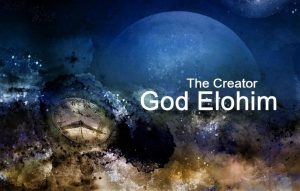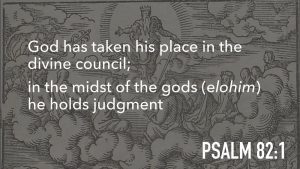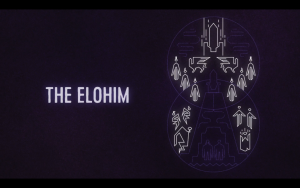
Shownotes
Welcome to Day 1466 of our Wisdom-Trek, and thank you for joining me.
I am Guthrie Chamberlain, Your Guide to Wisdom
Elohim In The Council – Worldview Wednesday
Wisdom - the final frontier to true knowledge. Welcome to Wisdom-Trek! Where our mission is to create a legacy of wisdom, to seek out discernment and insights, to boldly grow where few have chosen to grow before. Hello, my friend, I am Guthrie Chamberlain, your captain on our journey to increase Wisdom and Create a Living Legacy. Thank you for joining us today as we explore wisdom on our 2nd millennium of podcasts. Today is Day 1466 of our Trek, and it is Worldview Wednesday. Creating a Biblical Worldview is essential to have a proper perspective on today’s current events. To establish a Biblical Worldview, you must have a proper understanding of God and His Word. This week, on our Worldview Wednesday episode, we will continue with our study based on a course I recently completed taught by Dr. Michael Heiser. Our study is titled “Sons and Daughters of God: The Believer’s Identity, Calling, and Destiny” Throughout this multi-week course, we will demonstrate that, in the Old Testament, “sons of God” and “holy ones” refers to supernatural beings whose Father is God and who work with God to carry out His will and that this divine family was present before humanity. By fully engaging with biblical texts such as Psalm 82; Psalm 89, and Deuteronomy 32:8–9, our study will show that this divine family functions as a template for God’s human family. God desires of humans, as His imagers, to participate in His council. This study addresses issues such as polytheism, the nature of the (little ‘g’) “gods,” and the uniqueness of Yahweh. Within this study, we will apply insights to the New Testament texts and shows how the metaphor of being in God’s family informs our sense of identity and mission as believers.
Elohim In The Divine Council
· Segment 14: Who Is/Are Elohim? (Part 1)
Refers to God of Israel, but Also Other Gods
So, how do biblical writers use the term elohim? Well, the most apparent referent would be the God of Israel. You’ll recall in Psalm 82; the word elohim occurred twice; the first one was undoubtedly singular and, of course, pointing to the God of Israel, later called “the Most High” in verse 6. But in Psalm 82:1, we also had the plural elohim of Yahweh’s council. God takes His stand in the divine assembly, in the midst of the gods, and in the midst of the elohim, He passes judgment. So, the God of Israel, the gods of the divine council, elohim, is also used to refer to the gods of various nations.
For instance, in 1 Kings 11:33, we have the names Ashtoreth, Chemosh, and Milcom (foreign deities), and they are all referred to with the term elohim. Now, if elohim meant to bring with it a unique set of attributes, this verse right here (1 Kings 11:33) would sort of explode that idea all by itself. Here, you have three different foreign deities. Very obviously, they are not going to have a specific set of unique attributes that we would attribute to the God of Israel. So attributes aren’t wrapped up in the term elohim.
Elohim Connected to Territorial Spirits
Further, elohim is used in Deuteronomy 32:17 in juxtaposition with the term shedim, which most English Bibles have translated “demons.” So these are other entities that are referred to as elohim. Specifically, in that verse, the problem is that Israelites were not sacrificing properly to God but had rendered sacrifice to these other elohim who are shedim (“demons”). The term actually means territorial spirits, territorial entities.
But the point is, of course, that we are not talking about the God of Israel when we refer to elohim here, and we are not assigning a specific set of unique attributes to the shedim, to these lesser entities.
Elohim as Disembodied Human Dead
In 1 Samuel 28:13, elohim is used to describe the disembodied human dead. This is the medium at Endor story where Saul comes to her and wants to contact Samuel because God won’t answer his prayers. In the scene, she does whatever she does (we are not actually told what she does), but the result of it is, she is sort of shocked and dismayed because when she sees Samuel, that is sort of a clue that the person asking me to bring Samuel up is probably Saul. What she actually says to Saul is, “I see an elohim coming up out of the ground.” And then Saul asked her, “Well, what does he look like?” Again, he is fixated on one: “What does he look like?” And she describes him, and Saul says, “Sure enough, you know that that’s him; that’s Samuel.” We know from the discussion in this scene that the disembodied spirit of Samuel relates things to Saul that only Samuel would know or that God had told him before.
Elohim as the Angel of the Lord
Lastly, in Genesis 35:1–7, we have a reference to elohim. The reference may or may not refer back to either angels generically … In my view, it probably does not; it probably refers to one specific angel (God in human form) because the episode of Genesis 35:1–7 is linked back to something in Jacob’s life. Jacob is the person involved in that context. So you could have elohim here referring to the angel of Yahweh, the angel of the Lord.
Biblical Writers Not Thinking about Unique Attributes
Regardless of how to identify that last one specifically, what we have here is we have a collection of different entities, all of which are described with the word elohim. Only one of them was the God of Israel, at least as we think of Him. The angel of the Lord could, of course, be identified with the God of Israel, but the other ones that are in the scene are not.
And so, this alone tells us—the biblical usage of the term elohim tells us—that when a biblical writer used this word, he was not thinking of a unique, exclusive set of divine attributes; he wasn’t thinking about this term in Hebrew the way we think of the letters G, O, and D, and that’s really the disconnect.
Elohim as Member of the Supernatural Realm
Now, you might ask at this point, “Well, okay, if it doesn’t mean these other things, what does elohim mean then? If it’s not about attributes, what is the point of it? Why would a biblical writer use this term?”
A biblical writer would use elohim to refer to anything in the spirit world, which is by nature, the disembodied realm, the disembodied spiritual world. If you were a member of that world, you were an elohim. God is a member of that world. Demons or shedim are a member of that world. The gods of the council, angels, the deceased human dead, the disembodied human dead, all of them are members of the same place: the disembodied spirit world, the supernatural realm.
For this reason, I like to describe elohim as really a term that’s about residence or realm or even location. It’s not about a specific set of unique attributes. You would use the word elohim to describe some being in that realm. That’s where they live; that’s where they belong.
That’s all it means. So, in the spiritual world, we can have multiple, many elohim. That isn’t polytheism; that’s just the spirit world. It says nothing about any of these entities being equal or interchangeable, and that’s really at the heart of polytheism. We need to take a little closer look at that thought next.
· Segment 15: Who Is/Are Elohim? Part 2

Yahweh Is Unique
Now, we just talked about elohim being a place-of-residence term referring to any entity that is, by definition, a member of the disembodied spirit world. Yahweh, of course, the God of Israel, is a member of that world; He is an inhabitant of the spirit world. I like to put the relationship between Him and the other elohim like this: Yahweh, the God of Israel, is an elohim; He is one of many elohim, but no other elohim is Him; no other elohim is Yahweh. Yahweh is, again, maybe an awkward phrase, but I think it’s a good one. Yahweh is species unique. There is only one of Him; there is no other like Him.
Unique Qualities Assigned to Yahweh
Now, what this means in theological terms, and I think by way of practically understanding these theological terms, is that the elohim in biblical thinking, even though there are many, they are not equal and interchangeable. Yahweh is in a class by Himself. Yahweh is, in fact, distinguished by other means. He is described in ways that no other elohim are ever described. So biblical writers would assign unique qualities to Yahweh: things like the God of Israel; Yahweh is all-powerful, for instance (Jeremiah 32:17 and 27 as well).
Yahweh Is Sovereign King and Creator
Yahweh gets described as being the sovereign king over other elohim (Psalm 95:3; Daniel 4:35, for example). No other elohim are ever described in these terms. Yahweh is also described as the creator of the other members of His heavenly host council (Psalm 148:1–5; Nehemiah 9:6). Even the sonship language sort of telegraphs that idea; He is the originator of all the other ones. It never works the other way around.
Only Elohim to Receive Worship
Yahweh is the lone elohim as well, who deserves worship from the other elohim (Psalm 29:1). The other elohim are actually commanded to worship the Lord.
Uniqueness in Nehemiah 9:6
Nehemiah 9:6 I think sort of captures a lot of this. It actually says, “You alone are Yahweh,” again, speaking of the God of Israel. “You alone are Yahweh,” it’s a way in biblical language, biblical terminology, of saying, “You, Yahweh, are unique. There is only one of you.”
Multiple Elohim Does Not Equal Polytheism
So what we have when it comes to divine plurality in the Hebrew Bible (multiple elohim) is not polytheism. A biblical writer—someone who was, if we can use these terms, orthodox in their theology—would never think of Yahweh as though other elohim are on the same level or have the same attributes. That just wasn’t even a question. Yahweh is alone; He is unique; there is none like Him. So this is not polytheism. This is something else. This is what biblical writers believed: multiple entities in the spirit world, but only one of this kind. That is what a biblical writer believed, and so we don’t need to come up with sort of contrived explanations for what the term elohim means in Psalm 82 or any other place.
We don’t have to say things like they’re idols or they’re people. No, they are just other spiritual beings, and Yahweh is supreme and unique among them.[1]
That will finish our study for this week’s Worldview Wednesday. Next week we will study God’s proclamation “None Besides Me.” Tomorrow we will enjoy our 3-minute Humor nugget that will provide you with a bit of cheer, which will help you to lighten up and live a rich and satisfying life. So encourage your friends and family to join us and then come along with us tomorrow for another day of ‘Wisdom-Trek, Creating a Legacy.’

If you would like to listen to any of our past 1465 treks or read the Wisdom Journal, they are available at Wisdom-Trek.com. I encourage you to subscribe to Wisdom-Trek on your favorite podcast player so that each day’s trek will be downloaded automatically.
Thank you so much for allowing me to be your guide, mentor, and, most of all, your friend as I serve you in through this Wisdom-Trek podcast and journal.
As we take this Trek together, let us always:
- Live Abundantly (Fully)
- Love Unconditionally
- Listen Intentionally
- Learn Continuously
- Lend to others Generously
- Lead with Integrity
- Leave a Living Legacy Each Day
I am Guthrie Chamberlain….reminding you to ’Keep Moving Forward,’ ‘Enjoy your Journey,’ and ‘Create a Great Day…Everyday’! See you Tomorrow!
[1] Heiser, M. S. (2019). Sons and Daughters of God: The Believer’s Identity, Calling, and Destiny. Bellingham, WA: Lexham Press.